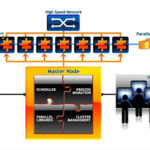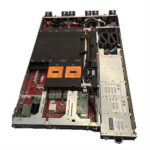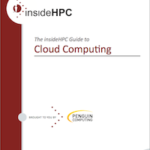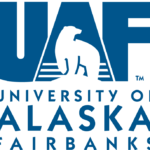Today liquid-cooling technology provider Asetek announced that the company has signed a development agreement with a “major player” in the data center space. “This development agreement is the direct result of several years of collaboration and I am very pleased that we have come this far with our partner. I expect this is the major breakthrough we have been waiting for,” said André Sloth Eriksen, CEO and founder of Asetek.
Penguin Computing Releases Scyld ClusterWare 7
“The release of Scyld ClusterWare 7 continues the growth of Penguin’s HPC provisioning software and enables support of large scale clusters ranging to thousands of nodes,” said Victor Gregorio, Senior Vice President of Cloud Services at Penguin Computing. “We are pleased to provide this upgraded version of Scyld ClusterWare to the community for Red Hat Enterprise Linux 7, CentOS 7 and Scientific Linux 7.”
Penguin Computing Lands 9 CTS-1 Open Compute Project Supercomputers on the TOP500
In this video from SC16, Dan Dowling from Penguin Computing describes the company’s momentum with Nine CTS-1 supercomputers on the TOP500. The systems were procured under NNSA’s Tri-Laboratory Commodity Technology Systems program, or CTS-1, to bolster computing for national security at Los Alamos, Sandia and Lawrence Livermore national laboratories. The resulting deployment of these supercomputing clusters is among world’s largest Open Compute-based installations, a major validation of Penguin Computing’s leadership in Open Compute high-performance computing architecture.
Asetek Lands Nine Installations on the Green500
“As seen at installations included on both the Green500 and Top500 lists, Asetek’s distributed liquid cooling architecture enables cluster energy efficiency in addition to sustained and un-throttled cluster performance,” said John Hamill, Vice President of WW Sales and Marketing. “Around the world, data centers are increasingly using Asetek technology for High Performance Computing while reducing energy costs.”
Omni Path Comes to Penguin Computing On-Demand
Today Penguin Computing announced several important achievements of its Penguin Computing On-Demand (POD) HPC cloud service, including a recent 50 percent increase in capacity and plans to double POD’s total capacity in Q1 2017. The upgrade will include new Intel Xeon processors and Intel Omni-Path architecture. “Rapid demand for and growth in our POD business reflects the significant benefits customers are experiencing, particularly since we announced availability of the OCP-compliant Tundra platform on POD late last year,” said Tom Coull, President and CEO, Penguin Computing. “With the Tundra platform, our customers have greater capacity due to faster scaling combined with increased performance and streamlined costs. Tundra on POD also highlights the growth and maturing market role of open computing, with thousands of high-speed, cost-efficient cores available to meet customers’ needs for faster, easier deployment of capacity at a low cost.”
Penguin Computing Adds Pascal GPUs to Open Compute Tundra Systems
“Pairing Tundra Relion X1904GT with our Tundra Relion 1930g, we now have a complete deep learning solution in Open Compute form factor that covers both training and inference requirements,” said William Wu, Director of Product Management at Penguin Computing. “With the ever evolving deep learning market, the X1904GT with its flexible PCI-E topologies eclipses the cookie cutter approach, providing a solution optimized for customers’ respective applications. Our collaboration with NVIDIA is combating the perennial need to overcome scaling challenges for deep learning and HPC.”
Penguin Computing Adds Remote Desktop Collaboration to Scyld Cloud Workstation
Today Penguin Computing announced Scyld Cloud Workstation 3.0, a 3D-accelerated remote desktop solution which provides true multi-user remote desktop collaboration for cloud-based Linux and Windows desktops. “Unlike other remote desktop solutions, collaboration via Scyld Cloud Workstation is more like sitting in-person with other engineers because a user can hand off control of their desktop to simplify collaboration on a project,” said Victor Gregorio, Vice President and General Manager, Cloud Services, Penguin Computing. “Scyld Cloud Workstation brings collaboration to life, providing a much more thorough and proficient interaction among researchers and engineers working together on a remote desktop. Ultimately, this allows customers a more efficient means to leverage cloud-based desktop solutions.”
Cloud Computing Guide
IT organizations are facing increasing pressure to deliver critical services to their users while their budgets are either reduced or maintained at current levels. New technologies have the potential to deliver industry-changing information to users who need data in real time, but only if the IT infrastructure is designed and implemented to do so. While computing power continues to decline in cost, the management of large data centers, together with the associated costs of running these data centers, increases. The server administration over the life of the computer asset will consume about 75 percent of the total cost.
Penguin Computing Powers Chinook Cluster at University of Alaska Fairbanks
Today Penguin Computing announced that it is delivering an energy-efficient, HPC cluster to the University of Alaska Fairbanks. The new cluster, based on Penguin Computing’s Relion server family was first delivered in April 2016 and has been incrementally expanding throughout the year. The cluster was named Chinook in honor of deceased UAF employee Kevin Engle, who was known for his passion for salmon and Alaska. Engle was a research programmer and ground station manager at UAF’s Geographic Information Network of Alaska.











